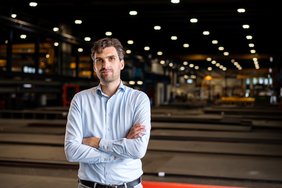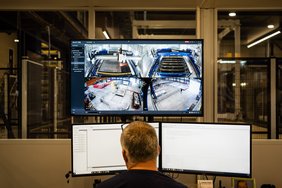Moerdijk, The Netherlands, 03/30/2022. Decarbonization, electrification, energy transition and sustainability are the future topics for the metalworking industry. Bas Sanders van Well, Business Unit Manager Benelux at Messer Cutting Systems, believes that much more flexibility and agility in the processes in the industry are needed to be able to cope with these challenges. In his opinion digitization of production is an absolute prerequisite. We spoke to him about his experiences and asked him about possible strategies.
As Business Unit Manager Benelux, you have been in constant contact with your customers since 2017, and you have known the industry since 2013. Where do you currently see the greatest need for action for companies in the metalworking industry?
In my view, digitization is a very important development for the industry. It is currently the key issue for making companies lean. In particular, the shortage of skilled workers plays a decisive role. For some time now, it has been very difficult for many flame cutting companies to find good technically trained personnel for some time now. In addition, some of the jobs are not very attractive. The topic of digitization comes at exactly the right time to solve these problems.
Why should flame cutting companies digitize their processes?
The biggest advantage is that they can do their production more smoothly and accurately with fewer resources. An increasingly important aspect are legal regulations and standards that must be complied with. Steel production and cutting suffer more and more from the effort and the requirements for documentation, registration and traceability. With the help of digitization, these things have become very easy for digitized production and can be done with little administrative effort. Software solutions provide great support and ensure the necessary automation of the production processes.
How should a company start the digitization process?
There is now a large selection of providers of digitization solutions. This means that there are enough options on the market to cover most needs for digitizing processes. But finding the right overall solution of machines, software and automation is quite difficult. The key here are the open interfaces. Because often several providers have to come together to connect the systems and create bridges of digitized communication.
We are most frequently asked about digitization projects when companies want to expand their production and need additional Messer machines to do so. This is often combined with the desire to digitize production as well. The task is usually to digitize the company without losing control, personal aspects and contacts to existing customers. Of course, costs and workload should be reduced. Often it is also about integrating existing ERP systems in order to create a digital workflow without floods of paperwork in production. For all these tasks, we see ourselves as equal partners to solve them.
How do you find the right solution and the right implementation partner?
Good preparation makes sense for a company that wants to digitize production and processes. In addition, it should be clear that digitization is a process and is usually implemented step by step. When selecting the right partner, one should ask a number of questions and research offers on the market accordingly. The most important questions are:
- Is it possible to connect this solution to existing software systems?
- Can this solution also be implemented on my other third-party machines?
- How good is the local/international support?
- How are the updates and further development of the solution regulated after my purchase?
- Do I always enjoy the latest developments?
Do I have any influence on the development?
It is also important that all project partners involved pull together. You always need third-party software, mostly that of the ERP systems. There are many effective packages for ERP solutions that have been launched on the market and that are already in use in most companies. Open interfaces then give the customer the opportunity to choose the best from different worlds. We work together with various providers. This means that our customer can enjoy a practical basis as a reference for a deal or comparison.
What are the particular challenges of a digitization project?
Well, you always need a proactive approach on the customer side. This means that there must be someone in the company who is responsible for managing and driving the project. In addition, some knowledge of IT and software in the company is necessary. Because a 100% outsourcing to the project partner is extremely difficult. It's no longer just about machines, but about the digitization of processes. This has far-reaching consequences for the entire company. You should be clear about that. The challenge for the external partner, like us, then lies in finding a solution to cover all of this together and thus help the customer.
Messer Cutting Systems is straightforward and, in my view, currently number one, offering both worlds, i.e. machines and software, from a single source. This allows us to get the best out of the machines.
Once the decision to go digital has been made, what happens next?
The first step is to understand the existing processes and their connections in your company. The next step is to define the best options where you can optimize your production and shorten and digitize workflows. Once this evaluation has been completed, the new workflows are displayed and the ideas discussed with the project partners. Of course, the implementation can take place step by step and in clearly defined phases. Sometimes the digitization project can get to such a scale that the impact on the business is too big, and we recommend our clients to split the project into several parts. For a successful implementation, you should always bring your production management, IT, work preparation, nesting and the board together to move the project forward.
Here are the most important project steps again:
- Analyze and evaluate your current situation internally.
- Define your desired situation.
- Work out a solution with your project partner and define the details.
- Have the project partner create a test environment on site.
- Implement the defined solution, step by step if necessary.
- Follow up with your project partners after a few months.
How long does a digitization project take?
Of course, this always depends on the complexity. In general, it takes between three and nine months from ordering the solution to implementation, quality assurance and acceptance. The better and closer the cooperation between those involved, the more open the communication, the better things will progress. We have found that a continuous contact process combined with a well thought out plan with written requirements for both parties is the best recipe for success.
Messer Cutting Systems offers itself as a partner for complete solutions. We listen to our customers and meet them where they are. If you use our solutions, you have the opportunity to continuously develop and improve them with us. We use your information to include them in new solutions.
You have already implemented numerous digitization projects for your customers. So, what did it actually do for customers?
In fact, one of the biggest benefits we see from our customers is the tracking, monitoring and traceability of products and cut components. But also fast reaction times in the preparation of offers and production planning mean that our customers are really enthusiastic. We have customers who have permanently won back lost customers because they can provide them with precise data, prices and dates on an ad hoc basis. Customers appreciate that.
Of course, digitization solutions also ensure efficiency and cost-effectiveness. You save time when receiving orders, in planning, production and business process analysis. Everything is faster, without media breaks and ensures reliable planning. You save resources, make better use of your machines and gain time for additional processes. You can reduce personnel costs and minimize downtime costs.
Are there also advantages for the employees?
Yes of course. Every single employee has the opportunity to work paperless and digitally. Digitization solutions enable everyone involved to track the entire production flow. Due to automation, work becomes easier and faster. It's more fun and well-motivated employees stay with the company longer.
Which future trends are important and how will digitization solutions develop?
I see the focus on the complete digitization of the workflow in combination with the automation of loading and unloading the machines. The future is the unmanned production factory.
Digitization will change existing jobs extensively. Work will change. The entire production will change in the future. Everything will be done much faster and will save resources. First of all, you have to understand this and adapt to it.
However, many companies are far from having arrived there. Although they know that digitization is inevitably coming their way, they have not yet done too much in this direction. Here I see an acute need for action in many areas so that the development is not missed and the competitiveness of European companies lags behind the aggressive Asians.
Mr. Bas Sanders van Well, thank you for the interview.

